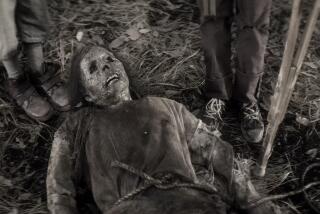MOVIE REVIEW : ‘Anguish’ Turns a Mirror on Its Audience
- Share via
Bigas Luna’s “Anguish” (citywide) is a horror picture that probes the relationship between film and its audience.
For all its Grand Guignol grisliness, it’s more speculative than suspenseful, more stylish than scary; indeed, as a thriller it doesn’t really work, but as a consideration of the power of the movies in blurring reality and fantasy, it is provocative and disturbing--”Anguish” is an apt title for its effect on the viewer. Ambitious and pitch-darkly amusing, it’s the kind of film that could end up a cult item on the midnight circuit.
“Anguish” is not meant to have a specific location, but in fact opens in the Gothic splendor of an Antonio Gaudi apartment house in Barcelona. In a dark, regal suite lives a tiny crazed woman named Alice (Zelda Rubinstein) and her hapless son John (Michael Lerner) and her collection of pet pigeons and snails. John, who turns throat-slasher under his mother’s spells, collects human eyeballs preserved in alcohol. This mother and son echo the extravagantly decayed brother and sister in Luna’s notorious 1980 “Poodle” (“Caniche”), and “Anguish’s” R rating is to be taken seriously--even if Alice and John aren’t.
Just when John’s gory rampages are about to turn your stomach, Luna pulls the camera back and reveals that what we’ve been watching is only a movie, called “The Mommy,” and playing at a perfectly ordinary suburban Los Angeles theater. From this point on, Bigas intercuts between what happens in that theater and “The Mommy,” which soons finds John continuing his slaughter at a revival house that is playing the 1925 version of Sir Arthur Conan Doyle’s adventure “The Lost World,” whose prehistoric animals seem to set him off in earnest. What Luna is doing is to set up a reverberating mirror effect, for “The Mommy” so captivates a man (Angel Jove, the brother in “Poodle”) watching it that he starts emulating John. In short, we’re watching a killer on the loose in a movie theater which, in turn, is showing a movie about a killer on the loose in a movie theater.
The problem here is that “The Mommy,” for all its gruesomeness, doesn’t convince us that it’s capable of mesmerizing anyone watching it and turning him or her into a robot killer. “The Mommy” hasn’t the crude power, for example, of Herschel Gordon Lewis’ 1963 schlocker “Blood Feast,” which you really believe could send the already unstable around the bend. Thus, the appeal of “Anguish,” for all its overall visual panache, intense razzle-dazzle editing and score, becomes more intellectual than emotional. For all the splendid, Shakespearean bravura of Rubinstein and Lerner, we realize that what’s important is not the carnage but the ritual of people sitting in a theater losing themselves in a movie--any movie. John may be a deadly dangerous victim of his mother’s madness, but when we watch this bulky, solitary figure buying a ticket to “The Lost World,” he, for a moment, becomes any moviegoer, and in him we can recognize ourselves seeking refuge from our own loneliness and our own eagerness to lose ourselves in those images up there on the silver screen.
‘ANGUISH’
A Spectrafilm release. Executive producers Andres Coromina, George Ayoub. Producer Pepon Coromina. Director Bigas Luna. Screenplay Luna; dialogue Michael Berlin. Camera Josep M. a Civit.Music J. M. Pagan. Art director Felipe De Paco. Special effects Josep Porcar. Costumes Consol Tura. Film editor Tom Sabin. With Zelda Rubinstein, Michael Lerner, Talia Paul, Angel Jove, Clara Pastor, Isabel Garcia Lorca.
Running time: 1 hour, 24 minutes.
MPAA-rated: R (under 17 requires accompanying parent or adult guardian).
More to Read
Only good movies
Get the Indie Focus newsletter, Mark Olsen's weekly guide to the world of cinema.
You may occasionally receive promotional content from the Los Angeles Times.









